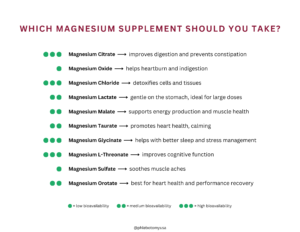18 Dec Which Magnesium Supplement is Best?
With the crazy amount of health information and products, knowing what’s best for our well-being is often hard. This is particularly true with magnesium, a mineral critical to our health. In this article, we dive into the mineral, exploring its vital bodily functions and learning the recommended daily intakes. We also discuss how to naturally include magnesium in your diet and the many supplemental forms. With so much information, knowing what’s best for your body is confusing. But fear not – this guide will help you understand how to best support your health with magnesium.
Why is Magnesium Important?
Magnesium is a key player in our body’s health. As the 7th most abundant macromineral, it is central to nearly every body process that keeps us functioning. Magnesium helps in more than 600 reactions necessary to keep us healthy and functioning properly. It’s involved in building cells, producing energy, and helping muscle function, among other things. The adult body contains about 22-30g of magnesium, with 99% of it in bones and muscles. It also plays a role in metabolism and balancing other minerals, such as calcium and potassium.
How Much Do I Need?
The RDA for magnesium is 400-420 mg for men and 310-320 mg for women. However, some recommendations suggest even higher intakes based on body weight. Despite its abundance in various foods, many adults are deficient. An estimated 50-60% of adults do not get enough of it in their diets. Signs of deficiency can be subtle, including muscle cramps, fatigue, and irregular heartbeat. On the other hand, too much magnesium can lead to toxicity with symptoms like diarrhea and stomach pain.
Where Do I Get It?
Adding a variety of magnesium-rich foods to one’s diet is an excellent way to meet the recommended intake:
-
- Seafood: Salmon is packed with magnesium and provides extra health benefits such as omega-3 fatty acids.
- Grains: A bowl of oatmeal can kickstart your day with a mineral boost.
- Vegetables: Magnesium is not just in leafy greens; bell peppers and sweet potatoes are also rich in this mineral.
- Legumes: Black beans are a great addition to any meal for an extra dose.
- Nuts and Seeds: Almonds can be enjoyed as a snack for a healthy dose of magnesium.
- Fruits: Bananas offer a portable and delicious way to increase intake.
What Supplements Can I Take?
While a balanced diet is the best way to get magnesium, supplements can help meet daily needs. Each supplement offers different benefits and is best for various health needs:
-
- Citrate: Used for improving digestion and preventing constipation.
- Oxide: Common for helping heartburn and indigestion.
- Chloride: Best for detoxifying cells and tissues.
- Lactate: Gentle on the stomach, ideal for those needing large doses.
- Malate: Supports energy production and muscle health, great for fatigue or fibromyalgia.
- Taurate: Promotes heart health and has a calming effect on the nervous and cardiovascular systems.
- Glycinate: Less likely to cause diarrhea, often used for better sleep and stress management.
- L-Threonate: Known to penetrate the brain barrier, it is best for improving cognitive functions.
- Sulfate: Epsom salt, used in baths to soothe muscle aches.
- Orotate: Considered one of the best for heart health and athletic performance recovery.
Choosing the “best” type of supplement depends on personal health needs and goals. All types increase levels in the body, but their effectiveness can vary. Factors like bioavailability (how well a supplement is absorbed) and individual health conditions influence how much magnesium the body can utilize from a supplement. Some forms, like citrate, glycinate, or chloride, are generally better absorbed than others, like oxide. However, each type of supplement can still increase magnesium levels to some extent, making them beneficial for those who need to boost their intake. Talking with a doctor is best before starting any supplement regimen.
Does Topical Magnesium Work?
Many people use topical magnesium (applied to the skin via creams, gels, or sprays) to boost their daily intake. This method is considered beneficial for those who have trouble with oral supplements, as it’s believed the skin can absorb the mineral. Applying magnesium to the skin could be helpful for muscle soreness and conditions like fibromyalgia. However, the scientific evidence for its ability to increase levels in the body is unsure. According to a review in Nutrients, claims for topical magnesium lack strong scientific support. It’s essential to understand this before choosing topical options as a treatment.
Conclusion
In conclusion, you need magnesium to be the healthiest you. Understanding its many forms and uses can help us make smart decisions about our health. As research continues, it becomes clearer that this mineral is fundamental to a thriving, well-functioning body.
For more information, check out this post by nutrition scientist, Dr. William Wallace.


